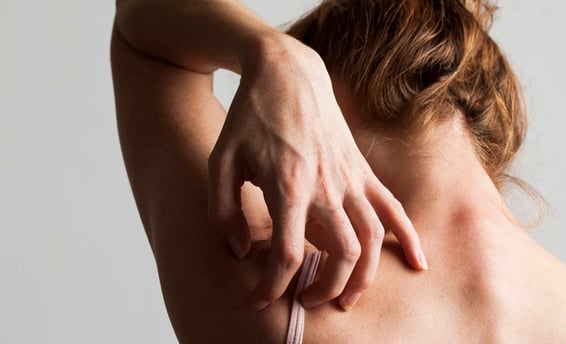Home Remedies For Itchy Skin
Some individuals may feel discomfort from itchy skin, while others may develop a rash or hives. Most episodes of itching skin are minor and may be treated at home.Home Remedies For Itchy Skin Are Discussed Below
HEALTH


Identify and Avoid Triggers of Itching
You can prevent the development of itchy skin by taking steps to avoid or counteract the factors that may provoke it, such as extreme temperatures, dry air, certain foods, or insect stings.
For example, if you are aware that your eczema is exacerbated by the drying effects of indoor heating and the cooler temperatures that you may experience during the winter, using a humidifier to add moisture to the indoor air and maintaining your skin's moisture with a gentle moisturiser can help you avoid the discomfort of itchy skin during that season.
Apply Coconut Oil
Coconut oil has been demonstrated to possess natural antimicrobial and antibacterial properties that can eliminate bacteria that contribute to the development of inflammatory acne. However, these properties have only been demonstrated in laboratory experiments and have not been tested on humans.
More recent research indicates that virgin coconut oil may alleviate irritated skin in individuals with moderate eczema (also known as atopic dermatitis).
Nevertheless, there are individuals who may be allergic to coconut oil or may find it irritating.
If you are uncertain about whether to apply coconut oil to your sensitive skin, consult your healthcare provider for advice. Additionally, it is recommended that you conduct a patch test on a tiny area of your skin before applying it to your entire body.
Utilise Oatmeal Baths
Adding colloidal oatmeal to a bath filled with tepid water can alleviate parched, itchy skin.
Continuously moisturise throughout the day.
Consistently moisturising your skin throughout the day can prevent it from drying out, which will also alleviate itching.
Use a moisturiser that is specifically formulated for sensitive skin, such as one that is free of fragrance.
It is also crucial to moisturise after a shower or bath, as your pores are more porous and more sensitive to moisturiser at this time.
Use Gentle Cleaners
It may also be beneficial to transition to mild cleansers, laundry detergents, and fabric softeners in order to mitigate and prevent itchy and bothersome skin.
Select moisturisers and soaps that are fragrance-free and water-based. Additionally, fragrance-free detergents that are specifically engineered for individuals with sensitive skin may prove advantageous.
Use Honey Products
Honey may be beneficial for alleviating irritating skin conditions and reducing bacteria on the epidermis, according to a limited number of studies.
Regular honey is too sticky to be applied to large areas of the body; however, there are lotions that contain honey that can be attempted.
Nevertheless, it is important to recognise that additional research is required to substantiate the advantages of honey in the treatment of skin conditions that induce irritation.
Utilise a Humidifier
If the itching is caused or provoked by arid air, a humidifier can be used to restore moisture to your environment.
In the winter, when indoor heating can cause skin dryness, the use of a humidifier can be particularly beneficial.
Apply Cold Compresses
Applying a cold compress, washcloth, or ice pack to your skin can alleviate inflammation and alleviate itching.
Adhere to a Proper Skincare Routine
A healthy hygiene routine can be beneficial for individuals with dry, sensitive, and irritated skin, as it can alleviate their itchy symptoms.
In practice, this entails the use of a mild, fragrance-free moisturiser to maintain skin hydration (particularly after a wash or shower) and the avoidance of products and fabrics that cause irritation.
Use over-the-counter Antihistamines
Eczema-associated irritated skin can be alleviated by over-the-counter (OTC) antihistamines such as diphenhydramine (Benadryl), loratadine (Claritin), or cetirizine (Zyrtec).
Long-acting antihistamines, such as cetirizine and loratadine, are non-sedating and can be administered on a daily basis.
Wear Loose Clothing (Breathable)
Wearing clothing that is permeable, such as those made of natural fabrics like cotton, can assist in preventing your epidermis from becoming overheated or perspired.
It may be particularly beneficial to prevent prickly or bothersome skin by selecting breathable fabrics for the gym and during the warmer months.
Refrain from Scratching
It may not always be feasible to refrain from clawing when one experiences irritated skin; however, persistent scratching can result in skin damage, which can result in infection and bleeding.
To mitigate the progression of sensitive skin, it is advisable to refrain from clawing whenever feasible.
However, when scratching is not entirely preventable, it is possible to prevent additional skin harm by donning fabric over the itchier areas of your skin and keeping your nails short.
When is it appropriate to consult with a Healthcare Professional?
Itchy skin is typically not a severe condition and can be effectively treated at home.
However, if your itching is severe, a life threatening condition called anaphylaxis immediately call emergency services or rush to hospital if possible.
Itching that persists for more than three weeks, or lacks a clear or identifiable cause, it is recommended that you consult with your provider for assistance.
Additional symptoms that necessitate immediate medical attention include:
Skin that is itchy or unpleasant and interferes with sleep
Severe skin discomfort
Variations in the aspect of the epidermis
Also Read Influenza (Flu )Symptoms And Treatment
There are many reasons why you could have itchy skin. It may be a sign of an allergic response, an insect bite, a skin disease such as eczema or psoriasis, a reaction to irritating chemicals in cosmetics and other items, or a reflection of hormonal changes during pregnancy.
Some individuals may feel discomfort from itchy skin, while others may develop a rash or hives.
Most episodes of itching skin are minor and may be treated at home.Home Remedies To Treat Iitiching Are Discussed Below
